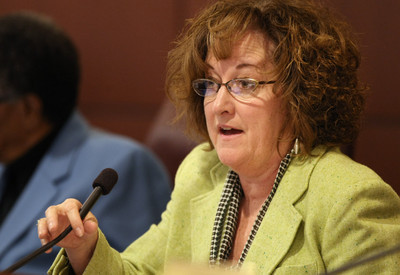Pay cuts may be avoided

CARSON CITY — Rather than cut teacher salaries, the state’s largest school districts will make cuts elsewhere, possibly resulting in larger classes and elimination of school programs.
Teachers union officials said Wednesday that they fought too hard for current salary levels to relinquish them, even if it means cuts to the classroom. They said the Clark and Washoe county school districts have agreed to keep teachers’ current salary levels and raises intact in the face of legislative cuts to state funding for schools.
A Clark County School District official said negotiations remain open and salary cuts could be proposed as a last resort. She confirmed the district would try to make the cuts imposed by the Legislature in areas other than salaries.
Clark County Superintendent Walt Rulffes "feels very strongly that we have to protect salaries as much as possible because our teachers are so underpaid already and they have such a tough workload," district lobbyist Joyce Haldeman said.
Lawmakers on Monday agreed to cut education funding in an amount equivalent to 4 percent of the salaries of teachers and other district employees. But it is up to the districts whether to pass the $192 million budget reduction along in salary cuts or trim it from other parts of their budgets.
With Clark County representing about 72 percent of the state’s schools, it probably would be asked to cut about $138 million, Haldeman said.
The head of the county teachers union said that cut should not come out of members’ paychecks.
"Our members don’t want salary cuts, and in our discussions with the (Clark County) school district, they have agreed to honor their obligations under the current contract," said Clark County Education Association President Ruben Murillo.
The cuts, he said, probably will result in increased class sizes, materials shortages and programs being cut.
"We understand the potential consequences in terms of working conditions, but we fought very hard to get these salary increases for our members," he said.
The union’s contract is up for renegotiation, but until a new contract is approved, the old one, containing last year’s pay increases and a schedule of experience-based raises that lawmakers also sought to eliminate, remains operative, Murillo said.
In passing the $192 million cut, legislators stressed that it might not turn out to be a salary reduction, though that is how they arrived at the figure.
"It seems that our only options are to reduce the amount that flows to the school districts," Assembly Speaker Barbara Buckley, D-Las Vegas, said in Monday’s committee hearing approving the cuts. "Their elected boards will make the decision on how these are implemented."
The head of the state teachers union said Clark and Washoe counties both have agreed not to cut salaries.
"Compensation is subject to bargaining at the local level," Lynn Warne said. The Clark and Washoe superintendents "have said they will maintain the previously ratified contracts. They will need to work out how to manage funding the rest of their budgets."
Haldeman, the district lobbyist, said she could not vouch for what promises might have been made in negotiations to which she was not privy.
"Negotiations are not finalized, and I am not part of the negotiating team," she said. "We are still in the process of getting funding" from the Legislature.
She said all cuts to school budgets, including salaries, are cuts to the classroom that have an effect on students.
"We don’t pay teachers enough anyway. How can we even think of taking more away?" she said. "Having said that, 89 percent of our budget is salaries. Unless we want to decimate everything else, we may have to consider" salaries, depending on the final education funding levels approved by legislators.
Rulffes would consider furloughs, targeted first to administrators before classroom teachers, if salaries have to take a hit, Haldeman said.
Legislators came closer to finalizing education funding Wednesday by rejecting several cuts Gov. Jim Gibbons had proposed for K-12. A joint subcommittee added about $80 million to Gibbons’ January proposals, saying some programs were too essential to reduce.
Buckley said including the salary reductions proposed by Gibbons and rejected earlier in the week, lawmakers have approved the addition of $271 million to the education budget for the next biennium.
The subcommittee voted to let teachers continue to get raises when they receive advanced degrees; to preserve a retirement bonus given to teachers in at-risk schools; and to partially maintain a regional professional development program for educators and an adult education program.
Buckley said the state’s level of education funding will trigger the addition of $162 million in federal stimulus funds for K-12, bringing to $434 million the total amount above Gibbons’ January recommendation.
"While every dollar we trim hurts, I’m pleased that through this laborious, three-month process, Democrats and Republicans were able to focus on the importance of education, focus on working together," Buckley said.
Left undecided was how to move forward on state funding for school-based remedial education programs. The governor recommended suspending programs totaling about $61 million. Lawmakers attested to the programs’ effectiveness in allowing schools to innovate and preventing students from falling behind and dropping out.
Senate Minority Leader Bill Raggio, R-Reno, proposed postponing a decision on how much to cut from the program until Friday, when the higher education budget also is scheduled to be wrapped up.
Contact reporter Molly Ball at mball@ reviewjournal.com or 702-387-2919.